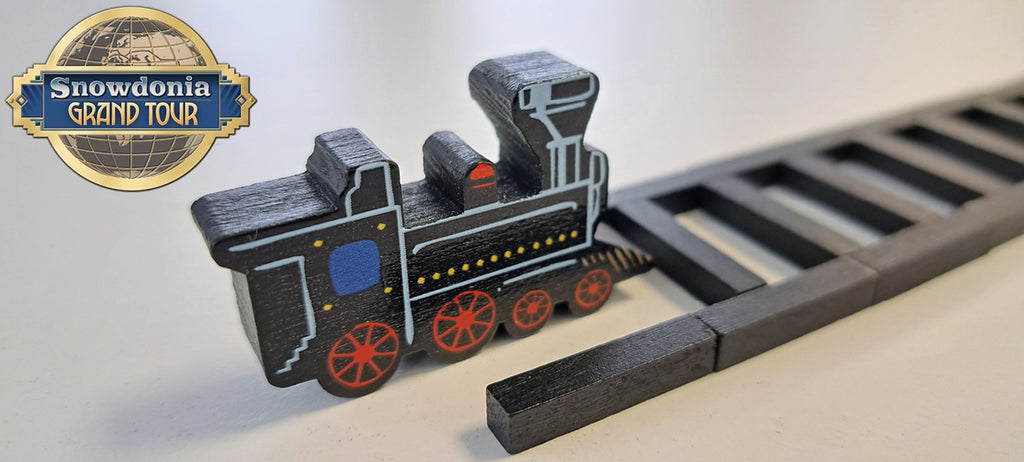“Who goes first?” is a question that has been with us in board games since their inception. The process of how that is decided, its impact on game outcome and the role it plays in strategy can vary wildly. The strategy around the humble first player marker is the subject of this first article of Train of Thought: a series exploring elements of Snowdonia, in the lead-up to its upcoming expansion: Grand Tour.
What is the first player marker and how do I get it?
Rules wise, it’s straightforward. Whoever holds the first player marker will place their worker first each round and play will then proceed clockwise from them. It is usually obtained by placing one of your workers on the final position of the stock yard action.
Why do I want the first player marker?
Going first in Snowdonia is very powerful. Placing your worker first, means you can take exactly the position you want, uncontested. This can be crucial to see your more ambitious plans executed, especially if they require multiple actions in the same round to achieve. Each action has slightly different nuances regarding first player:
A Stock Yard - Sometimes there will not be many of a particular resource available in the stock yard. In the case of coal and stone, which translate into extra actions or victory points respectively, this can get quite competitive. You never know when you will next see the resources you want come out of the bag, so getting them while you’re able can be prudent.
B Excavation - The timing of excavation is crucial. Excavating a station space pays out a good amount of victory points while also gaining you rubble to use towards contracts or conversion. It’s one of the only ways to both gain VP and resources without spending anything which makes it very efficient. The catch is, if you’re not scoring a station space, excavation can be weaker than other actions, especially at low work rates.
C Works - This action is often less contested, but it has fewer worker spots than others. Usually when you want to convert, you really need to, so it’s good to be sure you can.
D Lay Track - Track cards vary meaningfully in the number of points they’re worth and are often very limited in their availability. Additionally, the highest scoring contract cards all demand a lot of track to achieve, making track highly desirable.
E Build - Much like track, the opportunities to build are limited and the cost-to-reward ratio of station spaces are rarely equal. If you are aiming towards a particularly large build project or aiming for a specific train that is central to your strategy, you want to ensure you get it.
F Site Office - In lower player counts, there is only one worker space here. Given contract cards are one of the best ways to score points in the game, it usually gets taken early in the round. In higher player count games, you risk the contract you want being taken by somebody else, potentially wasting your action if the other options don’t suit your game plan.
G Surveyor - In most scenarios, this action has no limit to the number of times it can be taken, and the order players take it in is irrelevant. That said, in many scenarios, such as the Necropolis Railway, the surveyor mechanic can turn into a race with potentially game-deciding points available.
When is it worth it to take the first player marker?
As the above makes clear, it’s always better to have the first player marker than not. But it comes with a cost. The last position of the stock yard is one of the less valuable actions. You may not get a full three cubes and even if you do, they will generally be the ones nobody else wanted. So when weighing up if you want to become first player, you have to consider several factors:
1. Your current position in turn order - If you are in second place, you can usually still execute efficient rounds of play so long as your goals do not overlap too much with the first player. The relative gains here are smaller than if you are in last place, where you may find yourself completely unable to take some of the actions you want.
2. Your need for resources and the state of the stock yard - Leftover resource cubes at the end of Snowdonia are, usually, not worth anything. The actions spent gathering those resources are effectively wasted. If you already have a glut of resources, or the stock yard is emptying, you risk getting fewer or unnecessary cubes. You should be sure the first player marker is still worth it if you will not otherwise benefit much from the action spent obtaining it.
3. Your plan for how to use it - Ideally, when taking the first player marker, you should have a plan for your first action next round. Laying limited track, excavating a station space or taking a high value contract are all good options. If you are resource poor, the excavation rate is low and the available contracts do not help you, then you could be in a weak position to benefit from being first player next round.
4. Your opponents’ resources and intentions - Being first player is only valuable when other players want to take the same actions you do. For example, if you are the only player with steel bars, it’s less likely other players will be laying track or building using steel. In that instance, being further back in turn order might not matter. Keeping an eye on other players’ resources and contracts will help you get a better sense of their goals, better informing you when it will be important to act before them.
Hopefully you’re now equipped to take the first player marker exactly when you need it! How do you generally play around the first player marker? Do you take it often? Do you find yourself able to win without it? Leave a comment below to discuss!
If you’re interested in playtesting Grand Tour and are able to make “print and plays”, you can sign up to our playtest mailing list here.
Jaya Baldwin


You’re absolutely right. It’s very easy to be caught out by players snagging more than the default 3 cubes if you’re not keeping an eye out!
You didn’t mention checking your opponents contracts. If one of them can take cubes from the stock market before the worker actions are resolved you could end up with less than you expect when you take the first player spot
Leave a comment